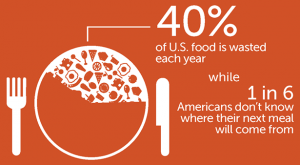Goodwill Spotlights: Second Helpings
Second Helpings: Nourishing Those in Need
40 percent of food produced in the United States goes to waste. A staggering and frustrating number, especially when you factor in the nearly 20 percent of Georgia residents facing food insecurity every day.
In fact, an average food-insecure family of four skips about 100 meals a month just simply because they can’t afford food. Hoping to bring the excess to those who need it most, Second Helping Atlanta bridges the gap between the waste and the want.
Started in 2004, the nonprofit describes itself as a “food-rescue” organization that focuses on two major societal issues: reducing hunger and food waste. This food waste occurs all over: farm-grown food that’s never sold, spoiled food, food not purchased from grocery store shelves, and food purchased but not eaten. Second Helpings finds this unused food, and “rescues” it.
Working with partner food-suppliers, including grocery stores, farmer’s markets, and caterers, Second Helpings connects leftover food with local pantries, community meal providers, and emergency housing facilities to provide food for individuals and families in need. They focus on securing perishable, highly-nutritious food to combat the health impact and typical diet of a food insecure individual.
“We recognize that the clients of the partner agencies who are receiving this food are surviving on highly-processed foods,” said Second Helpings’ Executive Director Joe Labriola. “We’d like to be able to introduce the types of food that they either don’t have access to or can’t afford.”
Second Helpings distributes the food using a powerhouse team of 360 active volunteers. Using their 90-minute model, volunteer drivers are connected with a route that gets them from their home to the food donor, in their own vehicles in 90 minutes or less. These boots-on-the-ground volunteers a quick and critical service and solution for a high-need problem.
The work of Second Helpings also generates an important multiplier effect. With their help, these partner organizations can funnel funds that might have previously been spent on food for their clients, to other critical services and programs.
“They can have a larger impact on the community they serve without necessarily having to raise more money,” Labriola said. “That’s another tremendous benefit and something that allows us to magnify what we are doing in the community every day.”
Second Helpings deliveries reach 4,500 people every day and amount to about 37,000 pounds of food each month. They have also recently started working with the new Mercedes Benz stadium, picking up leftover food from the executive suites, and taking part in the increased focus on the West Side of Atlanta.
The organization will continue its work in this neighborhood, with hopes of even great geographic expansion. Last year, they distributed 1.35 million pounds of food, a 60 percent increase over the previous year.
To continue to scale, Second Helpings is always looking for new partners, volunteers, and funders. More information can be found online at www.secondhelpingsatlanta.org.
